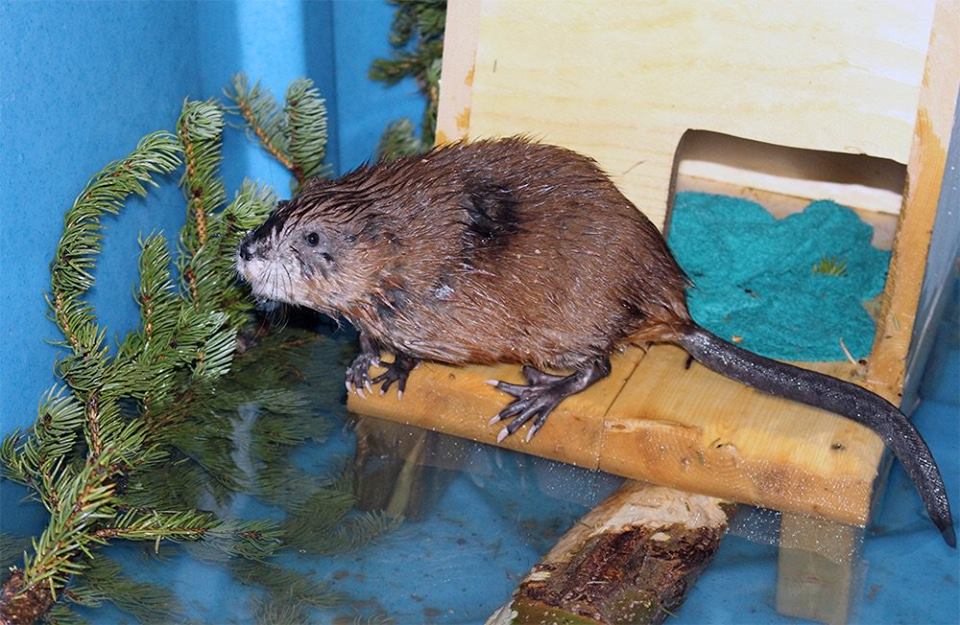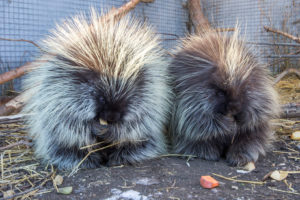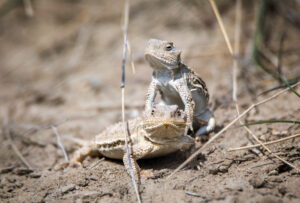Hey, what’s that little, brown, furry critter swimming around ponds and lakes? A muskrat!
Adults can only weigh up to 1.5 kilograms, so these little pond-dwellers can be hard to spot. However; muskrats are still the largest members of the rat and mouse family in North America!
Muskrats look a little bit like beavers, don’t they? With their scruffy brown furry bodies and aquatic lifestyles, it could be easy to mix them up!
Physically though, muskrats are quite different. First of all, they’re much smaller, and secondly their tails are narrow and flat. In fact they almost look like rat tails.
Muskrats have partially webbed hind feet that they use to help them swim, and they use their front feet like little hands to grab objects.
Just like beavers, muskrats love water! They tend to live in freshwater marshes, ponds, marshy areas of lakes and slow moving streams. But muskrats don’t build dams the same way beavers do.
Using mud, pond weeds, cattail and bulrushes, muskrats build their homes near the water. They tend to live in family groups and can be defensive about their portion of the pond. Each muskrat family’s section has a house, feeding area and canals through cattails and pond vegetation.
With winter on its way, muskrats are busy putting together domes made from frozen vegetation to cover holes in the ice. According to Alberta Environment and Parks’ website, muskrats keep the domes open throughout the winter by continually chewing away the ice and pulling up underwater vegetation to build an insulated dome. These miniature lodges are used as resting places during underwater forays and as feeding stations.
Muskrats like to eat meat and greens. They enjoy pond weeds and vegetation, but also like feasting on mussels, frogs, salamanders and small fish.
Muskrats are feisty little critters! Especially during breeding season when they are often seen fighting within their own families.
Fun Muskrat facts!
- Muskrats are capable of remaining submerged in water for up to 15 minutes in a relaxed state. They reduce their heart rates and relax their muscles, reducing the rate at which oxygen is used.
- Muskrats store a supply of oxygen in their muscles during a dive and are less sensitive to high carbon dioxide levels in the blood than are non-diving mammals.
- Muskrat’s front teeth are modified for underwater chewing. Their large incisors (or cutting teeth) protrude ahead of their cheeks and lips so they can close their mouths behind their teeth! This makes it possible for under water eating without swallowing water.
Young muskrats are now venturing out on their own and could struggle to find homes and territories since they‘re being claimed by older muskrats, and since preparations for winter started last month. It’s possible that you might see some younger muskrats making their way into urban and residential areas looking for winter homes.
If you see a muskrat far from water or venturing into a dangerous place, give AIWC a call
at 403-946-2361. AIWC is open every day from 9 a.m. to 5 p.m.
By Nina Grossman, AIWC Volunteer
Sources:
https://aep.alberta.ca/fish-wildlife/wild-species/mammals/rabbits-rodents/muskrat.aspx
nature.ca







26 thoughts on “Muskrats”
Hello, I believe I saw a muskrat (at first I thought it was a rat but now I realize it was probably a musktrat) at the Edmonton International Airport on Monday, Oct. 7th at around 10:30 pm. The muskrat was near entrance #10 and making its way across the pedestrian crosswalk towards the parking area. Then I lost track of it. I hope the muskrat is safe and okay – such a crazy area for it to be wandering around in!
My dog found a muskrat in our yard late at night a few days ago. My first thought was giant rat but his nose is short and rounded like a squirrel or beaver and a thick rat like tail. I almost trapped him the first night but he got away. He has been eating the food I left for him but I don’t want him to take up residence here as there are a lot of large dogs and outdoor cats and it is residential close to the highway. He may have come up our coulee from the park below as you suggest on your page. He may have been dropped by an owl too as he was exhausted and disoriented and I noticed a tiny amount of fresh blood on the pavement next to him. What should I do? I’m going to leave him some more food tonight because it is really cold and hes gonna need his energy to survive. Hes eaten cucumbers, grapes, a carrot and had fresh water till it froze today. I am in medicine hat alberta.
Hi Melanie,
Thank you for reaching out. Can you please give us a call at 403-946-2361> We can better assist you over the phone and are available each day from 9am to 5pm. Thank you!
There is at least 1 muskrat living in the pond at the dog park in Kings Heights, Airdrie. I saw 1 last year and another 1 today – could be same one. I assume it is a safe place as the pond is fenced now so dogs can not get into the water. I was wondering if it would go after the ducklings when they appear?
Hi Lynda, muskrats eat aquatic vegetation, from grasses, to small fish. They are not known to attack ducklings, frogs would probably be the largest food they eat.
I just saw a muskrat in the middle of the city in my backyard. We just came back from a lake, is it possible this little guy hitched a ride?
Hi Robyn,
Muskrats can be found in the city and this one could be moving to new territory, or he/she could have hitched a ride in your car but it’s not usually muskrats that do this – more common for marmots but anything is possible! Please give us a call at 403-946-2361 if you want to discuss more. Thank you!
Are you sure they don’t eat ducks and baby ducklings? There are a couple of muskrats in the pond by my apartment building and I’m wondering if they are picking off the little ducklings…I’ve certainly seen some of the ducks on the run when they get too close and these muskrats appear to be quite aggressive at times.
Hi Brenda, it would be very unlikely for them to eat ducks or ducklings as they feed mainly off of aquatic vegetation.
I have a muskrat lingering in the yard. It is far from the lake….chewing on the leaves and bushes.
When will it leave? Spring Lake, Alberta
Hi Mary, the muskrat will likely start to move to their overwintering area soon, but don’t be surprised if they continue to come out on warmer days in search of some extra food
I live on an acreage next to a beaver pond and boreal forest. a muskrat wandered out of the bush today up to my house. seems very unusual for mid January. It spent the day around my house then wandered back into the bush along the track it came in on. should I be concerned for it? I thought muskrats usually stayed in their dens or under the ice during winter.
Hi Bruce, thanks for the question! On warmer winter days muskrats will sometimes wander outside of their dens to refresh their food supplies, so this isn’t unusual behaviour. However, let us or your local wildlife centre know if you do spot the muskrat hanging around for long periods of time under your deck or garage and not moving back to the pond at the end of the day – it could possibly be a juvenile on the move finding its own pond, and may need assistance in getting to an appropriate location.
We live in prairie farmland alberta. Northeast of Airdrie. We have a muskrat that has taken up residence under one of our decks. I have video of it going back & forth collecting vegetation. It’s be 4/5 days and it’s still here.
The nearest marshland and or coulee creek is at least 1km away.
Seems awfully odd. Thought we’d reach out and check.
Hi Caron, this is pretty normal behaviour for a muskrat in the winter actually! Given the cold weather two weeks ago, it is likely the muskrat was frozen out of its pond, and is looking for somewhere warm and dry to huddle up in until the water thaws. If the animal appears to be injured, or is presenting a problem for you, please give us a call on our wildlife hotline at 403-946-2361 to go over the best way to move forwards. Thanks so much for reaching out!
I am wondering of the life cycle of a muskrat
In the wild, their average lifespan is 2-4 years.
There was a muskrat who spent the night in our garage. We managed to get it in a container and took it to the pond across the street. Will it try and come back?
As long as the pond is good habitat (and there are no other muskrats who have already claimed the area) it will likely stay over there!
Hello – I watched a muskrat swimming in my backyard pond and wandering around the yard yesterday. It seemed very relaxed despite the presence of three humans and three dogs. He may be living (?) under the back deck which borders the back end of the pond. He is welcome to stay, however, I want to ensure it stays safe as there are several neighbourhood cats that also like my yard. Can it protect itself from a cat? I am not worried about my dog as he won’t hurt it and the other two canines were just visiting. What can I do to help keep it safe if it decides to take up residence..? Thank you!
Hi Donna, thanks so much for looking out for this little one! Muskrats are very good at defending themselves, and are a bit larger than a cat tends to go for, so he should be alright. If you’re really keen on helping him out, you can pile some straw or other warm bedding materials under the deck for him to use, or provide a nest box with a small hole for him to curl up in during the winter months!
Hi Katrina –
Okay, good to know he/she can defend him/her-self. And I can definitely add a nest box with a small hole (with bedding material) under the deck for his/her comfort. Haven’t seen him/her since Tuesday, however, am not outside as much at this time of year. Hoping the little critter is still here as should be relatively safe in my yard. And there is scattered birdseed on the ground, in two places, as I feed ‘my’ birds, if he/she is hungry. I also use a pond de-icer through the winter to keep an opening for the birds’ watering needs. Thank you for your prompt response; is much appreciated.
You are so welcome Donna, it sounds like you’ve got a wonderful set up! Don’t be surprised if he/she’s not out much this winter though – muskrats tend to sleep most of the time through the cold weather, but it’s possible he/she could come out on a warmer day occasionally!
We saw these animals running across the road from a distance that are black but not low to the ground about 1 ft long and 1ft tall legs a couple inches long. They run from from one marsh to another. It looked like it had a red head? I am out on an acreage outside of Andrew, AB. We can’t figure out what it is.
It’s hard to say for sure what animal you’re seeing, but it sounds like it might be a mink. Mink are similar to weasaels, and have brown fur and a white chin. They prefer wetland habitats, which is why you might be seeing them near marshes.
They are eating all the duck and geese eggs, a pair wiped out a whole goose nest in no time.